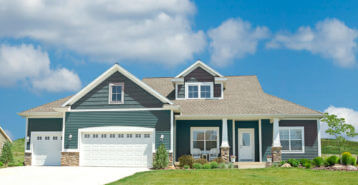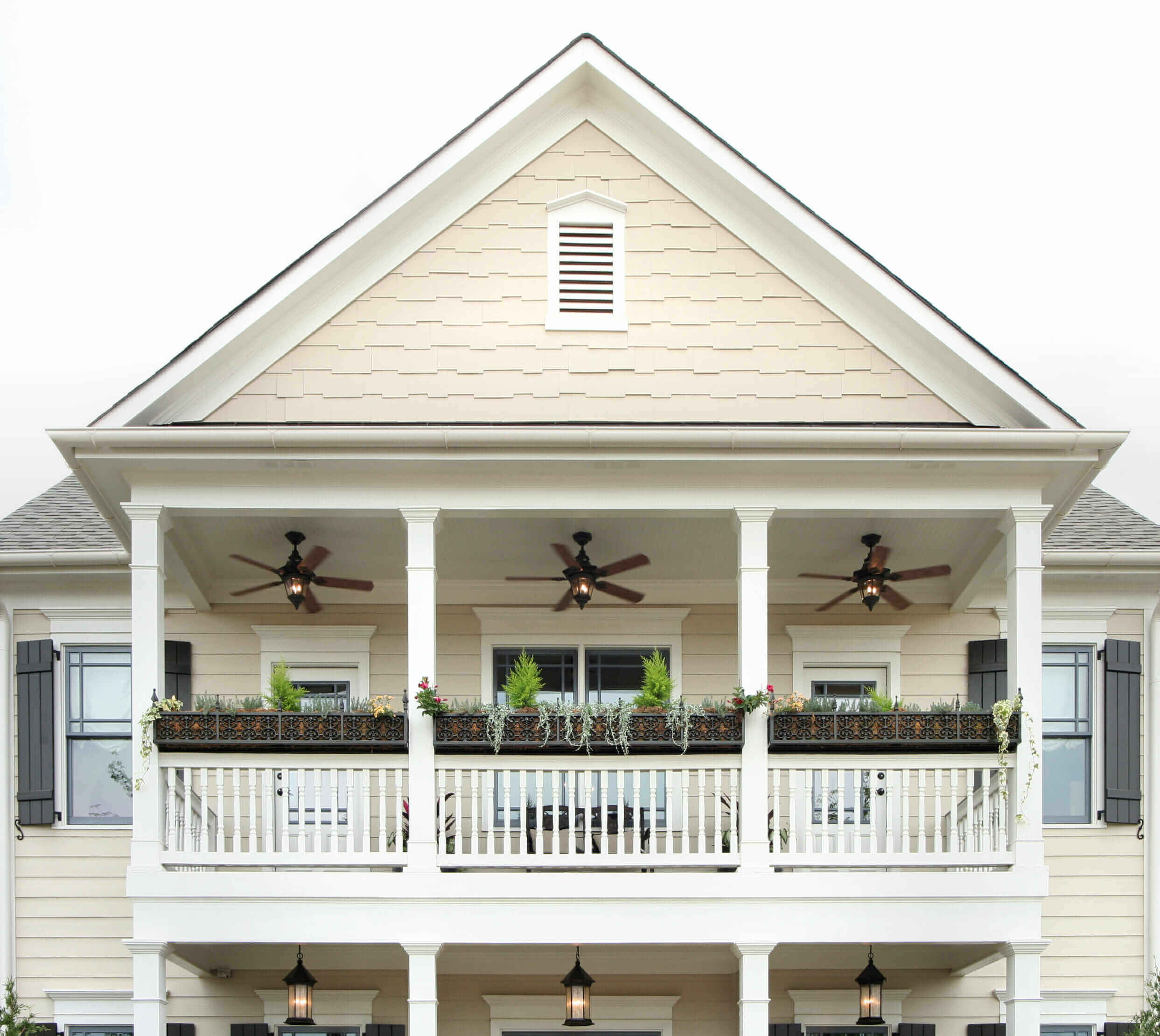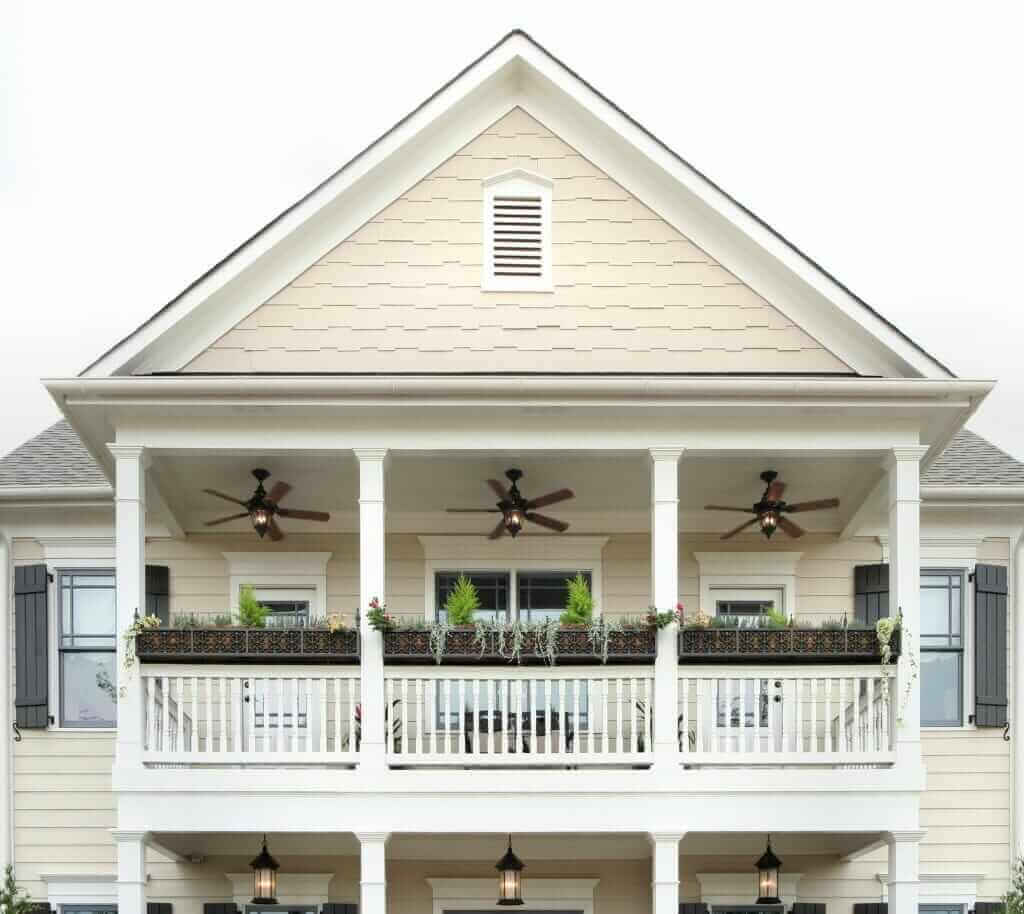

Siding

Average Cost: $7 - $17
This is our comprehensive review of James Hardie siding, covering product lines, costs, features, and how it compares to other leading siding brands. James Hardie has earned its reputation as the premier choice for fiber cement siding, with a proven track record of performance and innovation.
Our Verdict: James Hardie is best for homeowners who want a premium, long-lasting siding solution that provides outstanding durability, fire resistance, and aesthetic appeal. While the cost is higher than vinyl, the investment pays off in lower maintenance and better protection over time.
To understand why James Hardie leads the industry, it helps to look at the company’s history and scope. Founded in 1888, James Hardie pioneered the use of fiber cement siding — often referred to as HardieBoard — and remains the global leader in this category. Headquartered in Ireland but operating throughout North America, the company manufactures siding that resists fire, pests, rot, and severe weather. Its core product lines include HardiePlank lap siding, HardiePanel vertical siding, HardieShingle shakes, and the upscale Artisan collection. Many of these products are available with ColorPlus® Technology, a baked-on finish that maintains vibrant color for decades.
| Best For | Top Model | Cost Installed (per sq ft) | Standout Feature | Warranty |
|---|---|---|---|---|
| Durability and fire safety | HardiePlank | $6.50 to $17.50 | Fire-resistant fiber cement, long-lasting finish | Up to 30 years on panels |
At Modernize, we love James Hardie because it sets the gold standard for siding durability and performance. We know homeowners want siding that stands up to harsh weather, insects, and even fire, and James Hardie delivers on all fronts.
We also appreciate the brand’s ColorPlus® finishes, which are factory applied and baked on for fade resistance and low maintenance. Combined with a wide range of styles — from timeless lap siding to contemporary panels and cedar-look shingles — James Hardie makes it easy for homeowners to balance beauty with resilience.
Before you decide, it’s important to weigh the benefits and potential drawbacks.
James Hardie provides a full suite of fiber cement siding products to fit different architectural styles and homeowner preferences.

James Hardie offers standout siding products that combine design flexibility with long-term performance.
HardiePlank is James Hardie’s most popular product and is often the baseline used in real estate appraisals to increase home value.
HardieShingle is a favorite for homeowners in coastal New England and the Pacific Northwest, where wood shingles traditionally dominate but require frequent maintenance.
The Artisan Collection is popular with custom builders in upscale neighborhoods where design detail and premium finishes are a must.
Customer feedback consistently places James Hardie at the top of the siding market. Most homeowners value its fire resistance, weather durability, and long lifespan. While the price is higher than vinyl options, many feel the investment pays for itself through reduced maintenance and lasting beauty.
“… In my opinion, Hardie is the ideal siding material, if you are willing to forgo real wood. It’s popular because it’s cheaper than cedar and paint and long term maintenance costs are much lower. Rarely do you see a newer product, (especially a composite) that performs better than that the traditional stuff and is actually cheaper.” — Reddit Review
“We’re so grateful we chose HardiePlank. Our community was devastated by Hurricane Sandy…our home was not.” — Site Review
“I would do Hardie, again. I have had Hardie on 2 houses, one where it is rainy and wet, and the other where it is both very cold/very hot. I have self painted Hardie on the rainy/wet house. It’s been on for 25 years and looks great. We have painted it twice, once at install and once about 15 years in. On the brutally hot house, we had the factory painted Hardie installed along with self-painted Hardie shakes. The factory painted siding noticeably bleached out after 10-12 years, while the self painted shakes on the peaks still looked good.” — Reddit Review
James Hardie is a premium product, so costs are higher than vinyl siding. On average, homeowners pay $6.50 to $17.50 per square foot installed for HardieBoard, or between $13,000 and $35,000 for a 2,000-square-foot home.
| Product Line | Avg Cost Installed (per sq ft) | Est. Total (2,000 sq ft home) |
|---|---|---|
| HardiePlank Lap Siding | $6.50 to $10.00 | $13,000 to $20,000 |
| HardieShingle™ Accent Siding | $10.00 to $17.50 | $20,000 to $35,000 |
| Artisan Collection (Thick Panels) | $15.00 to $22.00 | $30,000 to $44,000 |
| Region | Low-End Installed (per sq ft) | High-End Installed (per sq ft) | Typical Total (2,000 sq ft) |
|---|---|---|---|
| Northeast | $7.00 | $14.00 | $14,000 to $28,000 |
| Midwest | $6.50 | $13.00 | $13,000 to $26,000 |
| South | $6.00 | $12.00 | $12,000 to $24,000 |
| West | $7.50 | $15.00 | $15,000 to $30,000 |
| State | Installed Cost (per sq ft) | Est. Total (2,000 sq ft) |
|---|---|---|
| Texas | $6.00 to $12.00 | $12,000 to $24,000 |
| California | $8.00 to $15.00 | $16,000 to $30,000 |
| New York | $7.50 to $14.00 | $15,000 to $28,000 |
| Florida | $6.50 to $13.00 | $13,000 to $26,000 |
| Illinois | $6.75 to $13.50 | $13,500 to $27,000 |
| Home Size | Installed Cost (per sq ft) | Est. Total Cost |
|---|---|---|
| 1,500 sq ft | $6.50 to $17.50 | $9,750 to $26,250 |
| 2,000 sq ft | $6.50 to $17.50 | $13,000 to $35,000 |
| 2,500 sq ft | $6.50 to $17.50 | $16,250 to $43,750 |
| 3,000 sq ft | $6.50 to $17.50 | $19,500 to $52,500 |
Because James Hardie projects are more expensive than vinyl, many homeowners explore financing. Options include contractor-backed financing, retailer credit programs, or personal home improvement loans. HELOCs may also be a smart choice for large-scale siding renovations.
When homeowners evaluate siding options, James Hardie almost always comes up as the premium benchmark. Its fiber cement products compete not only with other high-end siding materials but also with popular vinyl brands that appeal to budget-conscious buyers. Understanding how James Hardie stacks up against major siding competitors helps homeowners decide whether the higher upfront investment is worth it for long-term durability, fire resistance, and aesthetic appeal.
Homeowners considering James Hardie often have questions about cost, performance, and how it compares to vinyl. Here are the most common FAQs with clear, concise answers.
With proper installation and maintenance, James Hardie fiber cement siding can last 40 to 50 years or longer.
Installed costs typically range from $6.50 to $17.50 per sq ft, depending on the product line and location.
While fiber cement does not provide significant insulation, it pairs well with foam-backed sheathing to improve efficiency. Its durability and low maintenance also contribute to long-term savings.
Yes. The ColorPlus® Technology uses a factory-applied, baked-on finish that resists fading, chipping, and peeling.
Vinyl siding is more affordable, with costs typically half those of fiber cement. However, James Hardie is far superior in durability, weather resistance, and fire safety. Homeowners who want low maintenance and premium performance often choose Hardie despite the higher cost.
Fiber cement is naturally non-combustible, making it one of the safest siding choices in fire-prone regions. Many building codes in wildfire zones recognize James Hardie as a preferred material for fire resistance.
Because of its weight and need for precision, James Hardie siding should be installed by professionals. This ensures performance and protects warranty coverage.
James Hardie siding is the premier choice for homeowners who want lasting durability, fire resistance, and high-end curb appeal. While the cost is higher than vinyl or budget brands, the investment brings unmatched protection and long-term value. For those prioritizing safety and beauty, James Hardie is one of the best siding options available today.
Read real homeowner reviews, explore qualifications, and view promotions. Modernize makes it easy to browse professionals and find one that will be perfect for your project.